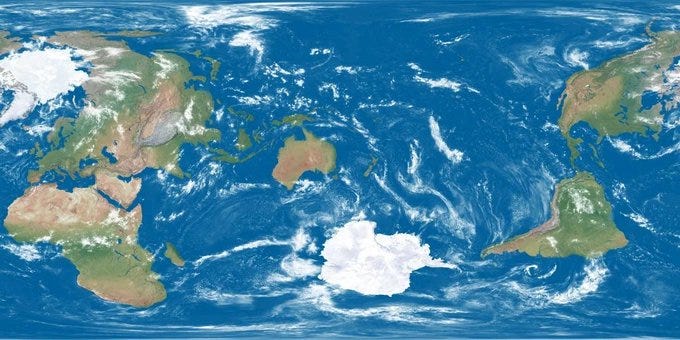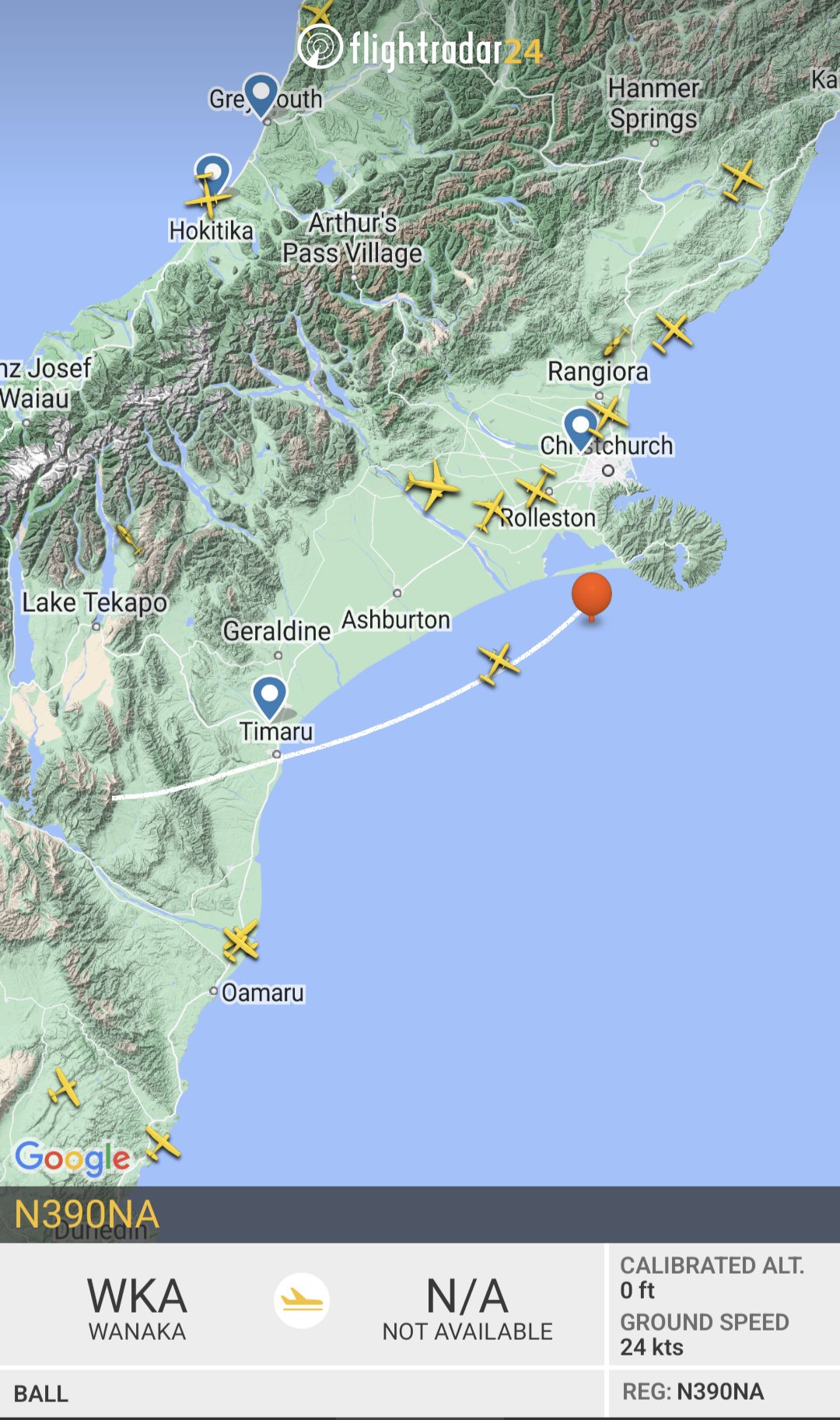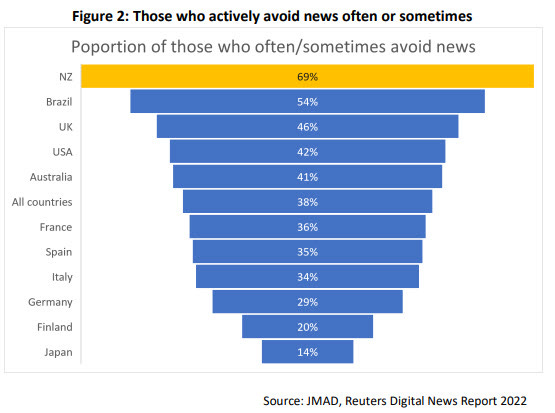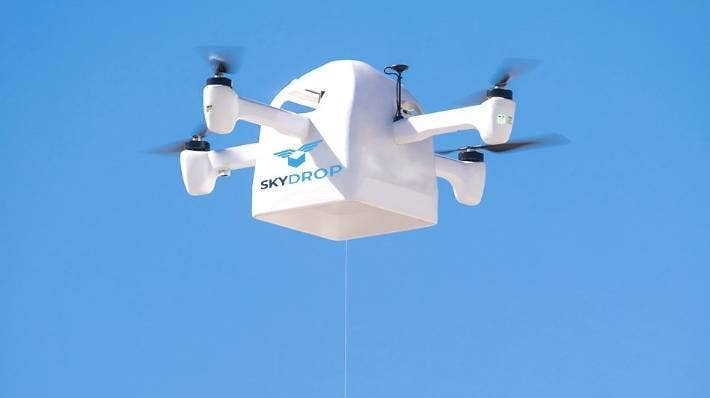⏩Fast Forward Aotearoa #36: On national missions🎯BIG balloon🎈B.I.G. ideas💡an aversion to news🗞️AUKUS pillar II 🌏pizza by drone🍕
The pursuit of sustainable intergenerational wellbeing
Kia ora,
Welcome to this week’s ⏩Fast Forward Aotearoa, thinking about emerging technology and the future of my corner of the world, Aotearoa New Zealand. Thanks for reading!
TIP: If you want to keep receiving the weekly Memia emerging tech newsletter but prefer not receive these Aotearoa-focused posts you can manage your subscription preferences here. (I’m in the process of peeling these ⏩ 🇳🇿 posts into a separate Substack… watch this space…)
In this week’s issue:
🎈BIG balloon A giant NASA super pressure helium balloon was the cause of yesterday’s UFO sightings over Te Waipounamu
💡B.I.G. ideas An excellent big-picture policy report from McGuinness Institute
🗞️An aversion to news Unsurprisingly, Aotearoa is a world-leader at avoiding the news
🌏AUKUS pillar II a raft of commentary on one of the biggest strategic decisions facing the country
👏Rollcall AI policy suggestions, drone pizza delivery and more supply chain resilience
🌏Kōhatu huna A Mercator projection… but centred on Aotearoa
🎯On National Missions How do “national missions” for research, science and innovation get decided and how can technology deliver to them?
🎈BIG balloon
First up, I was walking along New Brighton beach in Ōtautahi on Sunday afternoon and a bunch of people were pointing at a weird shiny object hanging stationary in the sky to the south. Finally, UFOs arriving in Aotearoa?
Closest magnification I could get:
TURNS out… this was a NASA’s “Super Pressure” balloon on its maiden flight from Wanaka, flying as high as 35km up. A look at FlightRadar showed its flight path clearly (at least from lake Benmore):
Full story here (the balloon apparently contains 532,000 cubic metres of helium…that’s a LOT of precious helium!!!):
(Thankfully Aotearoa doesn’t have any fighter jets or air-to-air missiles to shoot it down with…🤣 — see Memia 2023.06 Harmless science experiment)
💡B.I.G. ideas
I’ve been digesting the McGuinness Institute Te Hononga Waka’s comprehensive new discussion paper BIG Ideas: Brief to the Incoming Government - as founder Wendy McGuinness put it, a “polysolution to the polycrisis”, proposing 7 “B.I.G. policy actions”:
It’s a well-crafted read with some really meaty proposals, particularly around reforming government:
“Transforming governance institutions
On behalf of the citizens of the country, current and future, Parliament should unanimously specify the pursuit of sustainable intergenerational wellbeing as the core objective of good governance. Although material prosperity is an integral part of wellbeing, also critically important are non-material criteria (i.e. mana-enhancing dimensions of wellbeing: the mana of individuals, whānau, and communities).
To give credibility and effect to this commitment, form a cross-Parliament Parliamentary Governance Group (PGG) as a steward for intergenerational wellbeing.
Have the PGG advised by an advisory group that is genuinely diverse (in the broadest sense of that term), representing all the people of the country, including future generations through youth representation.“
Also in the annex the report finally puts into words a number of “wild card” scenarios which a number of us in the foresight community have been voicing for a while but which still appear *absolutely nowhere* in day-to-day public discourse… In particular, Climate Change Invasion is a scenario that I think needs careful modelling… and may colour the current discussions on AUKUS participation (see below…)
My one comment is that the impacts of exponential technology (particularly AI) appear only a few times throughout the report and without major analysis of the effects on the economy or social cohesion… (of course that’s what my book is about, so hold that thought…)
Congratulations to Wendy and the broad group of contributors - an excellent and well thought through report. (BUT will an incoming government actually take heed…?)
A national aversion to news
(Perhaps all part of the same discussion…)
The AUT research centre for Journalism, Media and Democracy (JMAD) published its 4th Trust in News in Aotearoa New Zealand report based on a survey by Horizon polling, which identied a continuing trend of falling trust in the news media.
The report also highlighted a profound national characteristic: 7 in 10 New Zealanders avoid consuming news, significantly higher than in other countries:
“While New Zealanders are interested in news, approximately 69% of us avoid news often, sometimes or occasionally. People are avoiding the news because they find it depressing, negative, and it is increasing their anxiety. Many people also find news repetitive, boring and overly dramatic”
Social media is an increasing source of news in Aotearoa, with Facebook at the top and growing (contrary to perceptions):
So far Substack’s market share is not explicitly quantified…it sits rolled up with “other online news sites” at 26%. Bizarrely the share of TV News (TVNZ and Newshub) actually increased… man is my finger not on the pulse… )
Is there something deep in the “national pysche” that is causing this widespread aversion to news… or is it more that the population is so small that nothing ever really happens of consequence, so time for sport?
Bigger questions:
Does a national aversion to news correlate with an aversion to political engagement?
What’s the underlying algorithm driving news prioritisation? A sample front page from today (ad blocker on) below… are these headlines really the ones which deliver the most advertising eyeballs? Heaven help us…🤦
AUKUS pillar II
The offer is on the table for Aotearoa to join “Pillar II” of the AUKUS defence pact1 - to get access to AUKUS military technology and AI...but without engaging with the tricky question of nuclear submarines. And boy the tightrope is wobbling hard...
Lots of analysis on this over the past couple of weeks. Personally I’m still formulating a view here: can a delicate balance be found between…
Joining?
Increasing militarisation of the previously peaceful Pacific region
Being seen by China to join a bellicose defence axis alongside the US, UK and Australia… in effect losing control over our “independent foreign policy” positioning.
Potentially upsetting our most important trade relationship with China
Spending billions of dollars on foreign-owned defence technology that may or may not deliver an adequate deterrent against a determined and potentially technologically superior adversary
And spending on military technology which may well become obselete by the time it’s procured
Getting integrated into a nuclear-armed and nuclear-powered defence stack, compromising Aotearoa’s nuclear-free status
OR not joining?
NOT spending the money, NOT getting the technology, NOT signing up with partners and losing any meaningful defence capability. Effectively hanging out the “Welcome mat” to allcomers. (Never discount the possibility that Aotearoa could be the next Ukraine…).
And quite possibly losing some of our currently privileged access to the US hegemonic AI technology stack (Google, Amazon, Microsoft, OpenAI…) that large parts of our economy now run on.
Some links to recent commentary:
From February: Te Pāti Māori announce military neutrality as new transformative defence policy
More recently: Prominent former Pacific leaders condemn AUKUS deal
Andrew Little, Defence Minister with the Government line: Independence is not isolationism
Nicholas Khoo: Aukus engagement has more benefits than risks
International relations lecturer Reuben Steff is the most prolific commentator by far - publishing three overlapping AUKUS articles in the last couple of weeks:
The Diplomat: The Strategic Case for New Zealand to Join AUKUS
Newsroom: The Swiss holes in anti-Aukus rhetoric (in reference to a recent Te Pāti Māori suggestion above that New Zealand should become the “Switzerland of the South Pacific”):
“Switzerland’s economy, standing at US$800 billion in 2021, allows it to spend just 0.7 percent of GDP or US$5.7b on its military. With this, it maintains 24,000 active troops (as well as 120,000 reservists), several frontline air squadrons and more for relatively small expenditure. By comparison, New Zealand’s economy in 2021 was US$250 billion, with a US$3.39b military budget in 2021, requiring 1.4 percent of GDP to help maintain 9300 active-duty troops (as well as 2500 reservists). Switzerland also has mandatory military conscription for every able-bodied male (females can volunteer for any position) and the army is interwoven with the country’s society.
In theory, New Zealand could engage with and learn from Switzerland. We would expand our military budget and capabilities, engage a strategy of self-reliance to enhance its resilience, ultimately providing a basis for a truly independent foreign policy. However, New Zealanders are already facing cost of living concerns. An ideological dedication to low taxes by Labour and National governments also means the country remains in first gear when it comes to state capacity, its military, welfare and health system and broader infrastructure. To be blunt, if we want more, we need to pay for it.”
Stuff: With so much at stake, can New Zealand afford not to be part of AUKUS?
“The second reason is that these technologies, especially artificial intelligence, are critical components of modern economies and industry.
They will become only more important in coming years as our economies become essentially “sci-fi” – data will be harnessed on a vast scale to empower practically every aspect of human activity – from how we govern, to the economy (driving massive advances in productivity), the nature of work and social interactions.
If we reject Pillar II of AUKUS, we reduce our access to vital high-technologies, and our economy and standards of living will decline relative to our peers.
The third reason is to future-proof tech access as the United States and China intensify their global competition. We have already seen Washington compel its allies to reject Chinese tech, like 5G. The US has also cut export of the most hi-tech semiconductors to Beijing.
Indeed, China or US-backed 5G networks will set the baseline for how countries interact with technology and data this century.
US and China-centric spheres of geopolitical technological influence will map across those parts of the world that adopt their preferred suppliers.
Right now, we are being offered an opportunity to secure access to high-technologies – this will not always be the case – and our decision to do so may depend on what technological sphere we want to be in.
The articles received a lot of feedback… good on Reuben for compiling the main counterargument points into a very long Twitter thread: https://twitter.com/ReubenSteff/status/1645893705285640192
Above all, I couldn’t agree more with his statement below:
"We in New Zealand need to get a debate over these issues fully out into the open and to start considering things to their fullest conclusions. The New Zealand people deserve to know what’s going on and what is at stake."
Foreign policy has been swept under the carpet for way too long in this country. Time to get this discussion out in the open and have a robust, grown up debate in time for this year’s election.
International perspectives:
Kishore Mahbubani in Australian Foreign Affairs: The View From Singapore
“…As Western power recedes from the world – especially from East Asia – Australia and New Zealand will be left stranded as lonely Western outposts in Asia.
But it’s fatal to find emotionally comfortable solutions to difficult geopolitical challenges. This is the fundamental problem with AUKUS. It provides comfort by creating new bonds with one’s old Anglo-Saxon brothers. It doesn’t address Australia’s strategic dilemmas.
…There’s no question that Australia’s most important neighbour for the next hundred years will be Indonesia. Australia will have to develop a close relationship with Indonesia (and its other ASEAN neighbours). And this is what makes the AUKUS decision so dangerous…
...By working with AUKUS partners, such as the UK, or with Japan, Australia is betting on the past. It’s certain that the future will be different. The time has come for Australia to make cold and rational calculations on how to adapt to this Asian century, which will bear no resemblance to the American century. AUKUS is a walk back to the past, not the future.”
Going a bit broader, two other viewpoints that are worth absorbing:
International security academic and provocative commentator Van Jackson in his biography:
“A constant source of my nagging dissatisfaction with how national security policy works is that it’s utterly by and for elites. On a good day, the national security state neglects the little guy, and siphons resources that might make his life better. On a bad day, it makes the little guy cannon fodder, and usually for reasons that are strategically dubious.“
Lot of truth in that. Minimising that outcome should be a key goal of any Aotearoa engagement.
While not directly addressing the AUKUS deal, David Skilling is full of insights in his analysis of the growing challenges with the China relationship in this recent podcast:
Finally, two satirical views from Australia:
Awwwwkus! TheJuiceMedia from 1 year ago:
Utopia: Australia’s Defence Policy in 2023 Explained (brilliantly acted):
“…So, under this scenario we're spending close to 30 billion dollars a year to protect our trade with China …from China. and that doesn't strike anyone at this table as odd?”
Joking aside, a serious matter in need of mature and direct debate to define Aotearoa’s future. Are we capable of that?
Rollcall
A few shout-outs around the motu from the last couple of weeks:
📝A recent paper by the New Zealand AI Researchers Association: ChatGPT and Large Language Models: Implications for policy makers. Practical suggestions… if a little politely phrased for action.
Meanwhile:
🍕SkyDrop launched the first drone-delivery trials in Aotearoa in Huntly, of all places.
🌐 The prolific team of Matt Boyd, Nick Wilson and Ben Payne submitted to the Productivity Commission’s recent inquiry on Aotearoa’s supply chain resilience: NZ Economic Resilience: Focus on Global Catastrophic Risks
Kōhatu huna
🌏A Mercator projection centred on Aotearoa:

🎯On national missions
Continuing on with the latest book instalment…
Keep reading with a 7-day free trial
Subscribe to Memia to keep reading this post and get 7 days of free access to the full post archives.










